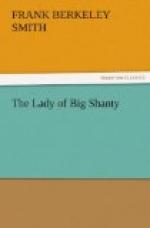Holcomb looked Thayor squarely in the face, read its sincerity and said slowly, lowering his voice:
“He is still in hiding—was the last time I saw him.”
“When was that?” asked Thayor, his eyes boring into the young woodsman’s.
“About a month ago—Ed Munsey and I were cutting a trail at the time.”
“Would you mind telling me?” persisted Thayor. “I have always thought that poor fellow was ill treated. Your father thought so too.”
Holcomb dropped his eyes to the cloth, rolled a crumb of bread between his fingers and said, as if he was thinking aloud:
“Ill treated! I should say so!” Then he lifted his head, drew his chair closer to the group, ran his eyes around the room to be sure of his audience, and said in still lower tones:
“What I’m going to tell you, gentlemen, is between us, remember. None of you, I am sure, would want to get him into any more trouble, if you knew the circumstances as I do. One night about nine o’clock, during a pouring rain, Ed and I lay in a swamp under a lean-to. Ed was asleep, and I was dozing off, when I heard something step in the brush on the other side of the fire. I couldn’t see anything, it was so dark, but it sounded just like an animal slouching and stepping about as light as it could. It would stop suddenly and then I’d hear the brush crack again on the left.”
Thayor was leaning now with his elbows on the table, as absorbed as a child listening to a fairy tale. The others sat with their eyes fixed on the speaker.
“Any unusual noise at night must be looked into, and I threw a handful of birch bark on the fire and reached for Ed’s Winchester. I had to crawl over him to get it, and when I got my hand on it and turned around a sandy-haired fellow was standing over me with a gun cocked and pointed at my head.
“I knew him the minute I laid eyes on him. It was Bob Dinsmore, who killed Jim Bailey over at Long Pond. He’d been hiding out for months. He was not more than thirty years old, but he looked fifty; there was a warrant out for him and a reward to take him dead or alive. He kept the gun pointed, drawing a fine sight on a spot between my left eye and my ear.
“‘Hold on, Bob!’ said I; ‘sit down.’ He didn’t speak, but he lifted the muzzle of his gun a little, and there was a look came into his eyes, half crying, half like a dog cornered to fight.
“‘S-s-h!’ said I; ‘you’ll wake up Ed.’
“‘I got to kill ye, Bill,’ said he.
“‘Sit down,’ I said, for I saw he was so weak his thin legs were trembling. ‘Neither Ed nor I are going to give you away—sit down,’ and I shook Ed. He sat up blinking like an old toad in a hard shower. ‘By whimey!’ said Ed, staring at Bob as if he had seen a ghost.
“‘I’m hongry, Bill,’ said Bob. ‘Bill, I’m hongry,’ and he began to stagger and cry like a baby. I got hold of his rifle and Ed caught him just as he fainted.




